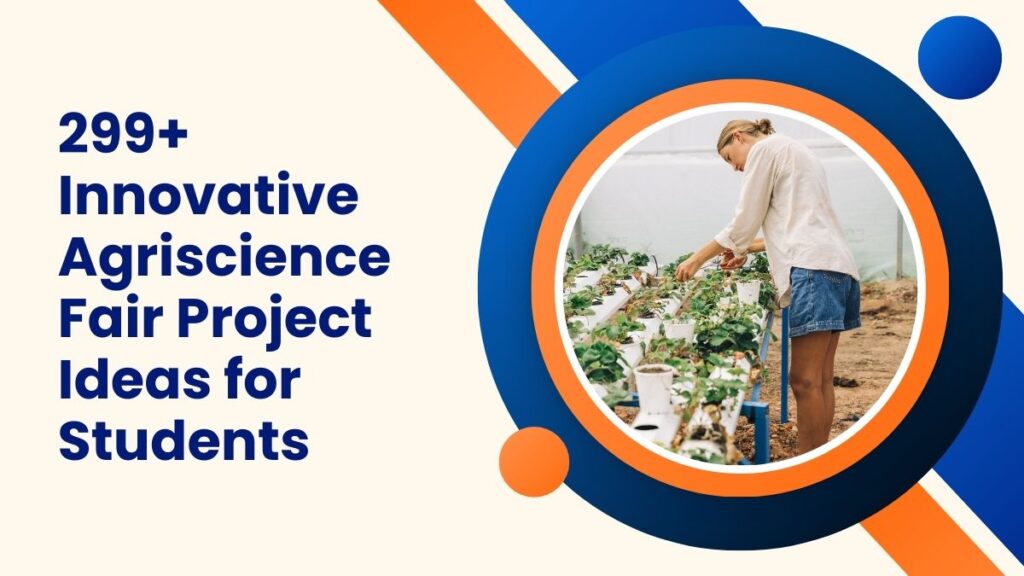Discover simple and fun Agriscience Fair project ideas! Explore topics like sustainable farming, food security, and new technology in agriculture. Perfect for students looking to make a real impact with their projects.
Agriscience is an exciting area that mixes science with agriculture to tackle important issues like food production, sustainability, and protecting the environment. As the world’s population grows, understanding agriscience becomes even more vital.
This field teaches us how to grow crops and raise animals while finding new ways to make farming better and more sustainable. Doing agriscience fair projects allows students to use scientific methods to solve real problems, boosting their critical thinking and problem-solving skills.
In this blog, we will look at a variety of interesting agriscience project ideas, such as plant growth experiments, sustainable farming practices, environmental studies, and new farming technologies.
Picking the right project can spark a love for science and agriculture, leading to future careers in these important areas. Whether you want to study soil health or the impact of technology on farming, this guide will help you find the inspiration and resources you need to start your project.
Agriscience Fair Project Ideas PDF
What is Agriscience?
Agriscience is the study of agriculture and its related fields, encompassing everything from the cultivation of crops and livestock to the use of technology in farming.
It integrates principles from biology, chemistry, and environmental science to improve agricultural practices and enhance food production. Agriscience is crucial in addressing global challenges such as food security, climate change, and sustainable resource management.
Importance of Agriscience Fair Project Ideas
Agriscience fair projects play a crucial role in both education and community engagement. Here are some key points highlighting their importance:
Enhancing Understanding of Agriculture
- Agriscience projects help students understand agricultural concepts, practices, and the science behind food production.
- They foster awareness of the agricultural processes that sustain communities and economies.
Promoting Scientific Inquiry
- These projects encourage critical thinking and the scientific method, allowing students to formulate hypotheses, conduct experiments, and analyze data.
- Students learn to design experiments and evaluate results, enhancing their research skills.
Encouraging Sustainability
- Many projects focus on sustainable practices, helping students explore environmentally friendly methods and the impact of agriculture on ecosystems.
- This awareness is vital for promoting responsible stewardship of natural resources.
Addressing Real-World Issues
- Agriscience projects often tackle pressing issues such as food security, climate change, and pest management, providing students with a context for their studies.
- Engaging with real-world problems fosters a sense of responsibility and urgency among young scientists.
Cultivating Interest in Agriculture Careers
- Exposure to various aspects of agriscience can inspire students to pursue careers in agriculture, environmental science, or related fields.
- Projects provide insights into diverse career paths, from research to agribusiness.
Promoting Collaboration and Community Engagement
- Many projects encourage teamwork and collaboration, whether through group experiments or community garden initiatives.
- Engaging with local farmers and agricultural organizations strengthens community ties and promotes knowledge exchange.
Fostering Innovation and Creativity
- Students are encouraged to think creatively about solutions to agricultural challenges, leading to innovative ideas and practices.
- Projects can highlight new technologies or methods that enhance efficiency and sustainability in farming.
Building Presentation and Communication Skills
- Presenting projects at fairs helps students develop public speaking and communication skills.
- Sharing their findings with peers and the community enhances their ability to convey complex information clearly.
Increasing Awareness of Food Systems
- Projects can educate students about the food supply chain, from production to consumption, emphasizing the importance of local food systems.
- This knowledge promotes informed consumer choices and encourages appreciation for food sources.
Instilling a Sense of Curiosity and Lifelong Learning
- Engaging in agriscience fosters a curiosity about the natural world and a desire to learn more about science and agriculture.
- This foundation can lead to lifelong interest in scientific exploration and environmental stewardship.
Tips for Selecting a Agriscience Fair Project Ideas
Choosing the right agriscience project can significantly affect your experience and results. Here are some tips to guide you:
| Step | Description |
|---|---|
| Identify Your Interests | Select a topic that excites you. Passion for the subject will keep you motivated throughout the project. |
| Research Current Trends | Look into current issues in agriculture, such as sustainable practices, food security, or technological advancements. |
| Consider the Scope | Ensure your project is neither too broad nor too narrow, making it manageable within your available time and resources. |
| Interest | Your engagement with the topic will impact both your enthusiasm and the quality of your work. |
| Resources | Assess the materials, tools, and time you have available. Make sure you can access everything needed to complete the project. |
| Feasibility | Choose a project that is realistically achievable within your timeframe, considering experiment complexity and research depth required. |
Top 299+ Innovative Agriscience Fair Project Ideas for Students
Here’s a comprehensive list of agriscience fair project ideas categorized by topic.
Plant Growth and Development
- Effects of different soil types on plant growth
- Impact of light color on photosynthesis
- Hydroponics vs. soil growth
- Influence of organic vs. chemical fertilizers
- Effects of pH levels on plant growth
- Companion planting benefits
- Temperature effects on seed germination
- Mycorrhizal fungi in plant growth
- Watering frequency and plant health
- Indoor vs. outdoor plant growth
- Effect of humidity on seed germination
- Growth patterns of plants in shaded areas
- Impact of wind on plant growth
- Using plant growth regulators
- Effects of CO2 levels on photosynthesis
Pest Management
- Natural pesticides: garlic spray on pests
- Beneficial insects in pest control
- Organic vs. synthetic pest control
- Companion planting for pest management
- Neem oil on common garden pests
- Impact of crop rotation on pest populations
- Traps for monitoring insect populations
- Effects of temperature on pest behavior
- Organic insect repellents effectiveness
- Use of beneficial nematodes in pest control
- Impact of habitat diversity on pest populations
- Biological control methods in agriculture
- Pesticide resistance in insects
- Using traps for pest management
- Repellent plants for garden pests
Soil Science
- Effects of soil erosion on plant growth
- Nutrient levels in different soil types
- Impact of compost on soil health
- Role of cover crops in soil fertility
- Earthworms and soil quality
- Soil moisture levels and plant growth
- Comparing sandy vs. clay soils
- Effects of salinity on soil health
- Testing soil for nutrient content
- Impact of tilling on soil structure
- Bioremediation of contaminated soil
- Effect of organic matter on soil quality
- Soil temperature effects on germination
- Soil microbiome diversity and health
- Comparing urban vs. rural soil quality
Water Management
- Different irrigation techniques’ effectiveness
- Rainwater harvesting and its benefits
- Soil moisture and plant growth relationship
- Drip irrigation vs. traditional methods
- Water quality effects on plant growth
- Effects of drought on crop yields
- Water conservation techniques in agriculture
- Impact of overwatering on plants
- Testing different mulching materials
- Comparing groundwater vs. surface water irrigation
- Effects of irrigation timing on crop yield
- Evaluating the use of greywater in agriculture
- Measuring evaporation rates from soil
- Effects of saltwater intrusion on crops
- Investigating water runoff management
Sustainable Practices
- Benefits of urban gardening
- Exploring aquaponics systems
- Crop rotation impacts on soil health
- Role of agroforestry in sustainability
- Effects of organic farming on biodiversity
- Impact of permaculture design principles
- Sustainable practices in livestock farming
- Evaluating local vs. imported produce
- Community-supported agriculture benefits
- Zero-waste gardening techniques
- Sustainable pest management strategies
- Using cover crops for soil health
- Impact of conservation tillage
- Food forests and their benefits
- Studying community gardens’ impact
Genetics and Breeding
- Selective breeding in plants
- Impact of genetic modification on crops
- Heirloom vs. hybrid seed comparison
- Evaluating traits in different plant varieties
- Genetic diversity in agricultural crops
- Using CRISPR technology in agriculture
- Studying disease resistance in plants
- Effects of breeding on fruit size
- Exploring plant patenting issues
- Genetic markers for crop improvement
- Impact of hybrid vigor in crops
- Cross-pollination effects on plant traits
- Evaluating drought resistance in crops
- Studying flower color inheritance in plants
- Gene editing for pest resistance
Food Science
- Nutritional analysis of fruits and vegetables
- Effects of cooking methods on nutrient retention
- Comparing organic and conventional produce
- Fermentation processes and food quality
- Evaluating food preservation methods
- Shelf life comparison of different foods
- Impact of processing on food nutrients
- Food labeling and consumer awareness
- Studying foodborne pathogens
- Evaluating local vs. imported food quality
- Effects of packaging on food freshness
- Nutritional differences in various grains
- Investigating food additives and preservatives
- Impact of climate on food production
- Culinary uses of lesser-known plants
Environmental Science
- Agriculture’s impact on local wildlife
- Effects of agricultural runoff on water bodies
- Climate change and crop yields
- Role of pollinators in agriculture
- Deforestation for agricultural purposes
- Soil conservation techniques and their importance
- Investigating invasive species in agriculture
- Sustainable land use practices
- Biodiversity in agricultural ecosystems
- Effects of monoculture on soil health
- Assessing carbon sequestration in farming
- Exploring agroecology principles
- Environmental impact of livestock farming
- Measuring agricultural carbon footprints
- The impact of urban sprawl on agriculture
Technology in Agriculture
- Using drones for crop monitoring
- Role of AI in precision agriculture
- Soil moisture sensors and their effectiveness
- Mobile apps for farmers’ decision-making
- Vertical farming technology
- Use of robotics in planting and harvesting
- Exploring blockchain in food supply chains
- GPS technology in farming
- Automated irrigation systems
- Impact of big data on agriculture
- Remote sensing for crop health analysis
- The role of biotechnology in crop production
- Exploring smart farming technologies
- Digital tools for pest management
- Comparing traditional vs. modern farming methods
Animal Science
- Effects of diets on livestock growth
- Free-range vs. caged chicken production
- Animal manure’s impact on soil fertility
- Studying livestock behavior in different environments
- Role of genetics in animal breeding
- Effects of stress on animal health
- Investigating animal welfare practices
- Comparing dairy farming methods
- Impact of grazing systems on pasture health
- Evaluating the use of antibiotics in livestock
- Studying aquaculture practices
- Investigating animal-human interactions
- Impact of climate on livestock production
- Sustainable practices in animal husbandry
- Studying the economics of livestock farming
Alternative Practices
- Exploring the benefits of permaculture
- Investigating agroecology for sustainability
- Evaluating the use of biochar in agriculture
- Testing the effectiveness of natural fertilizers
- The role of traditional farming practices
- Exploring the benefits of crop diversity
- The impact of sustainable forestry on agriculture
- Urban agriculture as a solution to food deserts
- Analyzing the benefits of polyculture
- The potential of regenerative agriculture
- Investigating traditional irrigation methods
- Exploring the concept of food sovereignty
- The role of indigenous knowledge in agriculture
- Studying the effectiveness of green roofs
- Impact of environmental stewardship on farming
Experimental Agriscience Fair Project Ideas with Animals
- Conducting seed viability experiments
- Investigating different mulching techniques
- Effects of windbreaks on crop production
- Controlled vs. natural environment plant growth
- Testing different composting methods
- Studying plant responses to fertilizers
- Effects of temperature on seed germination
- Investigating soil amendments on plant growth
- Testing hydroponic systems vs. soil
- Effects of light exposure on plant growth
- Analyzing the effectiveness of various pesticides
- Studying plant recovery from stress
- Investigating the impact of shade on growth
- Experimenting with plant propagation techniques
- Testing the effects of companion plants
Innovative Agriscience Research Project Ideas
- Developing eco-friendly packaging for produce
- Creating a small-scale hydroponic system
- Investigating biodegradable materials in agriculture
- Designing vertical gardens for small spaces
- Exploring renewable energy in agriculture
- Developing automated planting systems
- Evaluating the impact of sustainable pest control
- Researching ways to reduce food waste
- Innovations in food storage techniques
- Developing apps for sustainable farming practices
- Investigating alternative proteins for livestock feed
- Studying the use of aquaponics in urban settings
- Exploring the role of greenhouses in agriculture
- Investigating water purification systems for farms
- Testing the use of native plants in landscaping
Great Agriscience Fair Project Ideas With Food
- Investigating the economic impact of local farms
- The role of education in sustainable agriculture
- Exploring food distribution systems
- Analyzing consumer behavior toward local food
- Evaluating the impact of community gardens
- Studying the effectiveness of farmer cooperatives
- The role of agriculture in climate change mitigation
- Comparing traditional and modern farming education
- The impact of food policies on local farmers
- Exploring the future of urban agriculture
- Assessing the role of technology in farming education
- Investigating the impact of agriculture on mental health
- Evaluating strategies for reducing agricultural waste
- The importance of agricultural research funding
- Exploring the effects of globalization on farming
Best Agriscience Fair Project Ideas High School
- The benefits of seasonal eating
- Investigating local food movements
- The impact of agriculture on rural economies
- Studying the ethics of genetically modified organisms
- The role of agritourism in local economies
- Analyzing the environmental impact of farming practices
- The influence of social media on food choices
- Investigating the impact of climate policies on agriculture
- Assessing the role of government subsidies in farming
- Evaluating strategies for sustainable fisheries
- Studying the effects of urban sprawl on local agriculture
- Exploring alternative farming methods for urban areas
- Investigating food safety regulations and their impact
- The role of nutrition education in public health
- Exploring the intersection of agriculture and art
Step-by-Step Guide to Planning Your Experiment
Here is the step-by-step guide to planning your experiment:
| Step | Description |
|---|---|
| Define Your Research Question | Clearly articulate what you want to investigate. |
| Conduct Background Research | Gather information on your topic to understand current knowledge and identify gaps your project could fill. |
| Formulate a Hypothesis | Based on your research, predict the outcome of your experiment. |
| Design the Experiment | Outline your methods, including materials, procedures, and how you will collect and analyze data. |
| Conduct the Experiment | Follow your design meticulously, documenting every step. |
| Analyze Your Data | Use charts or graphs to visualize findings and identify trends or patterns. |
| Draw Conclusions | Relate your findings back to your hypothesis and research question. |
Wrap Up
In summary, agriscience provides many project ideas that can motivate students to explore agriculture and environmental science more deeply. By choosing a project that matches your interests and addresses real-world issues, you can make a meaningful contribution while learning valuable skills.
Whether you decide to experiment with hydroponics, check water quality, or create automated irrigation systems, each project offers a chance for discovery. As you work on your agriscience projects, remember to focus on research, data collection, and presenting your findings clearly. These experiences not only help you learn more about agriculture but also prepare you to face challenges in the future.
Embrace the creativity of agriscience, and let your projects lead to new ideas that can help our planet. By getting involved in agriscience fair projects, you play a crucial role in building a sustainable future for farming and the environment.
Meet Tom Latham from Good Project Ideas! He’s passionate about sparking creativity and making learning fun for all. Tom loves crafting engaging projects that inspire curiosity and hands-on exploration. Join him in bringing ideas to life!



